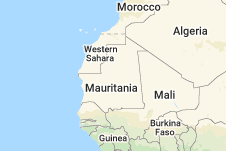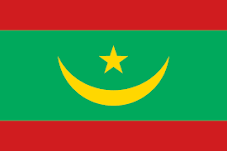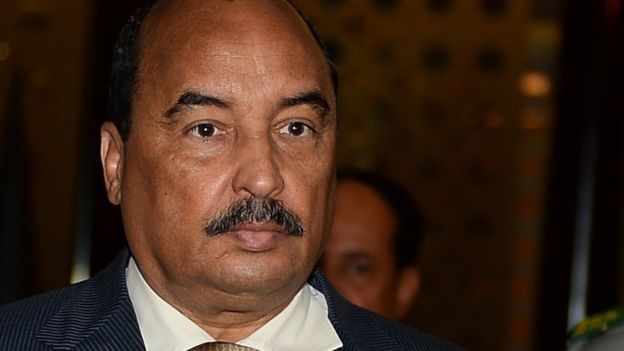
Mauritania

Brief Overview
Mauritania is essentially a desert country, with vast expanses of pastoral land and only 0.5% of arable land. According to the National Statistics Office, Mauritania has a population of about 4 million (2018), and a population density of 3.9 inhabitants per square kilometer, making it the fourth least densely populated country in Africa. By 2020, the country will have more urban than rural inhabitants, with 52.8% of the population living in urban areas, against 48.3% in 2013.
Political Context
Following the decision by President Mohamed Ould Abdel Aziz to abide by the Constitution and not seek a third term, Mohamed Ould Ghazouani won the first round of the presidential elections held on June 22, 2019 with 52% of the vote, marking the first democratic transition of power in Mauritania. President Ould Cheikh El Ghazouani assumed office in August 2019 and formed his government.
Economic Overview

The Islamic Republic of Mauritania
Capital: Nouakchott
Population: 3.6 million
Area: 1.04 million sq km (398,000 sq miles)
Major languages: Arabic (official), French, others
Major religion: Islam
Life expectancy: 57 years (men), 61 years (women)
Currency: Ouguiya
UN, World Bank

Medium-Term Outlook
The medium-term economic outlook is favorable. Growth is projected to increase to an average of 6.2% for the 2019-2021 period. Continued expansion of the primary sector, strengthening of the services sector through the implementation of structural reforms, and an increase in mining production are expected to keep the country on this sound path. This robust macroeconomic framework is expected to strengthen, provided the government maintains fiscal prudence, by ensuring that public debt remains viable. An improvement in the terms of trade owing to an increase in international iron prices is expected to mitigate external pressures and allow the central bank to respond to financing needs.
Social Context
Mauritania experienced sustained GDP growth from 2008 to 2014, accompanied by significant improvements in household welfare. The annual real growth in mean household expenditure per capita was 1.52%. All quantiles did well and there was a sharp decline in the proportion of poor, which fell from 44.5% of the country’s population in 2008 to 33% in 2014. The improvement in living standards has been more marked among the poor and extremely poor than among the non-poor. Inequality has narrowed, as the Gini coefficient, which measures income inequality, decreased from 35.3 in 2008 to 31.9 in 2014. These developments are explained by improvements in production, productivity, and income in rural areas following the restructuring of the agriculture and livestock sector and by other factors such as internal migration and changes in relative prices.
However, some population groups in Mauritania have not benefited from this phenomenon, and the country is still lagging on many social indicators. Poverty has not fallen in the capital, Nouakchott, probably because of migration to urban areas and because the capital tends to attract the poorest of the poor. Labor force participation and the employment rate have not improved, and groups that have not benefited from social progress, such as youth, women, and low-income workers, are increasingly marginalized. Only 55% of children aged 6 to 11 are enrolled in primary school, one third of households live in precarious housing, and 38% of the population has access to electric lighting.
Physical Contacts of the Presidency
Name of Minister:
Address:
Telephone:
Fax:
Physical Contacts of the Prime Minister’s Office
Name of Minister:
Address:
Telephone:
Fax:
Physical Contacts of the National Assembly
Name of Speaker of the House:
Address:
Telephone:
Fax:
Physical Contacts of the Chief Of State and Cabinet Ministers
Name of Minister:
Address:
Telephone:
Fax:
Physical Contacts of the Ministry of Interior
Name of Minister:
Address:
Telephone:
Fax
Physical Contacts of the Ministry of Justice
Name of Minister:
Address:
Telephone:
Fax:
Physical Contacts of the Ministry of Foreign Affairs
Name of Minister:
Address:
Telephone:
Fax:
Physical Contacts of the Ministry of Women’s Affairs
Name of Minister:
Address:
Telephone:
Fax:
Physical Contacts of the National Human Rights Commission
Name of Minister:
Address:
Telephone:
Fax:
Physical Contacts of the Police
Name of Inspector General:
Address:
Telephone:
Fax:
Physical Contacts of the Military
Name of Inspector General:
Address:
Telephone:
Fax:
Important Information of Key Human Rights Issues in Mauritania
Number Prisons in Mauritania
Number Prisoners in Mauritania:
Secret Detention Centres:
Police Stations in Mauritania
What are the current and ongoing human rights issues in Mauritania?
(1) Freedom of the Press
(2) Human Rights Defenders Issues
(3) Impunity
African Union (AU)
Joined the OAU in
Signed the Constitutive Act of The African Union on:
Ratified:Instrument Deposited:
Signed:
Ratified:
Instrument Deposited:
Signed:
Ratified:
Instrument Deposited:
Signed: –
Ratified: –
Instrument Deposited: –
4.Protocol on Amendments to the Protocol on the Statute of the African Court of Justice and Human Rights
Signed: –
Ratified: –
Instrument Deposited: –
Signed: –
Ratified: –
Instrument Deposited: –
Signed: –
Ratified: –
Instrument Deposited: –
Signed: –
Ratified: –
Instrument Deposited: –
Signed: –
Ratified: –
Instrument Deposited: –
Signed: –
Ratified: –
Instrument Deposited: –
Signed: –
Ratified: –
Instrument Deposited: –
Signed: –
Ratified: –
Instrument Deposited: –
Signed: –
Ratified: –
Instrument Deposited: –
Signed: –
Ratified: –
Instrument Deposited: –
Signed: –
Ratified: –
Instrument Deposited: –